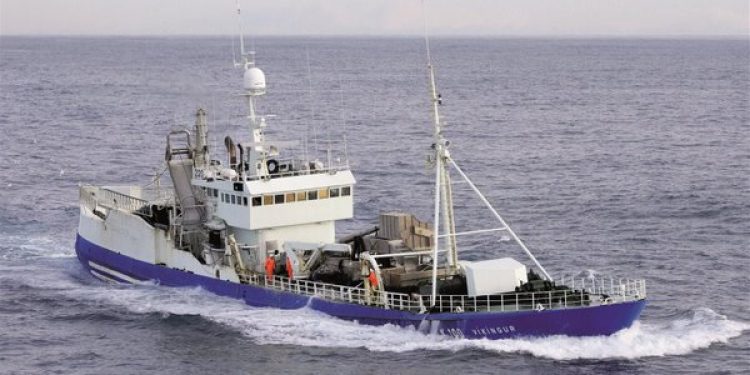‘It was perfect in every way. We dropped right down on the capelin mark exactly where we had been told it would be and didn’t need to spend any time searching. We shot first on Tuesday afternoon and managed to fill the purse seine. That was around 1400 tonnes of good-sized, quality capelin, although there was some feed in it so it wasn’t right for freezing,’ said Gudmundur Hafsteinsson, first mate on Víkingur AK.
It was remarkable that the ship landed a full trip this week with capelin caught in the Grímsey Strait. No other pelagic vessels were fishing or searching in that area, as the main fishing area right now is off the east coast with the capelin migrating rapidly southwards along the east coast. So the question is, why try for capelin in the Grímsey Strait?
‘There’s a story behind that. Arnthór Hjörleifsson, skipper on Lundey NS, was at a winter festival where he met a few inshore fishermen who told him about a massive capelin mark in the Grímsey Strait. As the forecast didn’t look all that promising further east, we decided to steam north from Akranes and see if there was any truth in the winter festival news. When we got here we got in touch with the inshore guys and they told us where to go. And there it was. We dropped right down on the mark and it didn’t take long to fill up,’ Gudmundur Hafsteinsson said, and added that since the news of their trip, more pelagic vessels have appeared in the same area, but since then the capelin have dispersed.
‘There were people calling us asking about how far we had searched and how the search had gone. But there was only one answer to that; we didn’t search at all, went straight to the position we had been given and hit the capelin on the spot,’ Gudmundur Hafsteinsson said, and commented that in the samples taken on board, there were 47 fish per kilo and with a very high roe content of as much as 67%.
‘This is capelin that would have been fine for freezing if it hadn’t been full of feed. Our feeling is that this capelin that we found off the north coast was closer to spawning than the capelin that’s being fished now off the east coast. Normally it’s the capelin that’s at the front of the migration that’s closest to spawning, but this time it was the other way around,’ he said.
When we spoke to him, Gudmundur Hafsteinsson was taking Víkingur to fishing grounds at the southern edge of the eastern fjords, with good weather forecast. This is the ship’s fourth trip this season, as Víkingur has normally only been used when the fishing is at its heaviest. Víkingur is purely a purse seiner, and limited to fishing when the capelin are within 50 to 60 metres of the surface. So the purse seine is the perfect fishing gear once the capelin have shown up on shallow grounds off the south-east of Iceland towards the end of the season.









